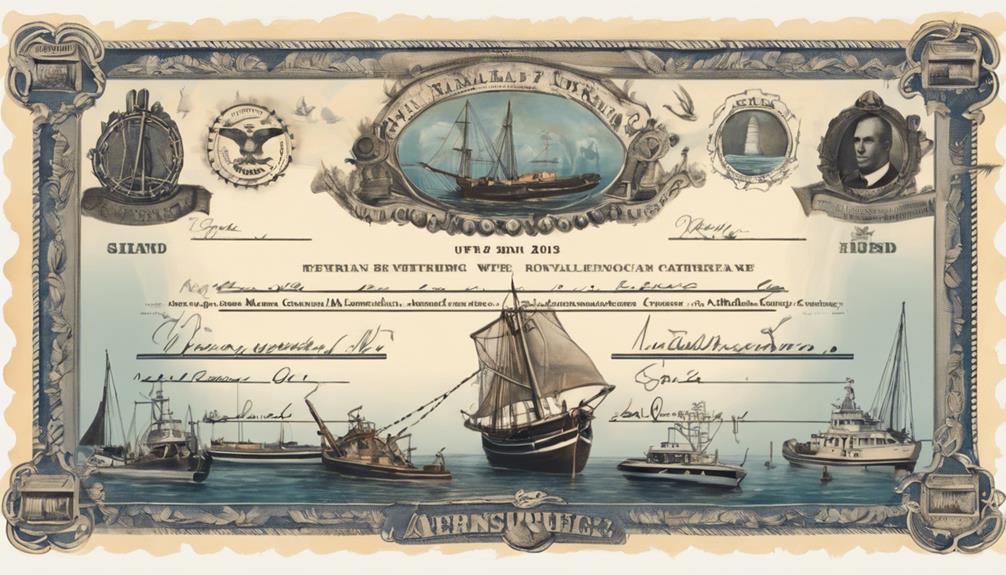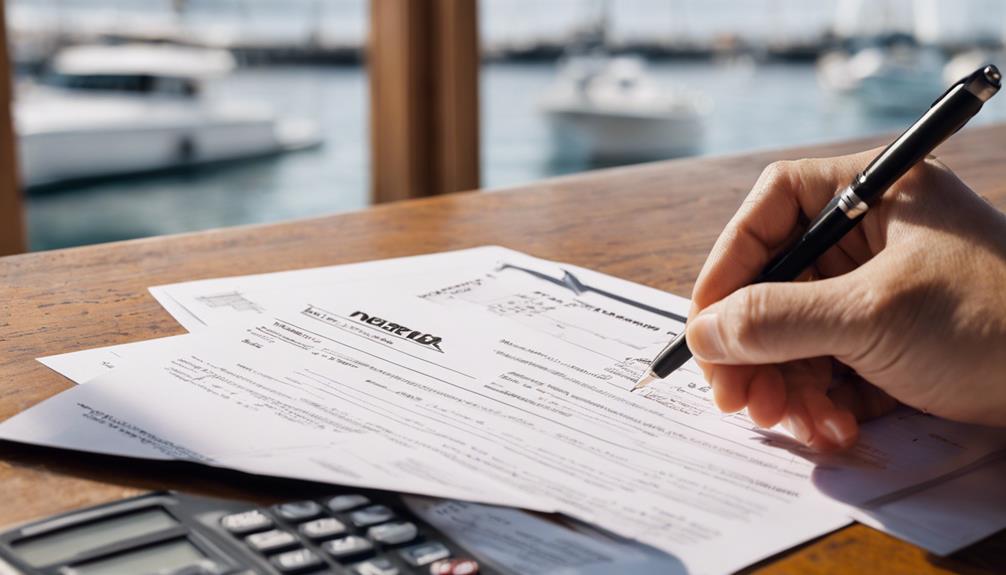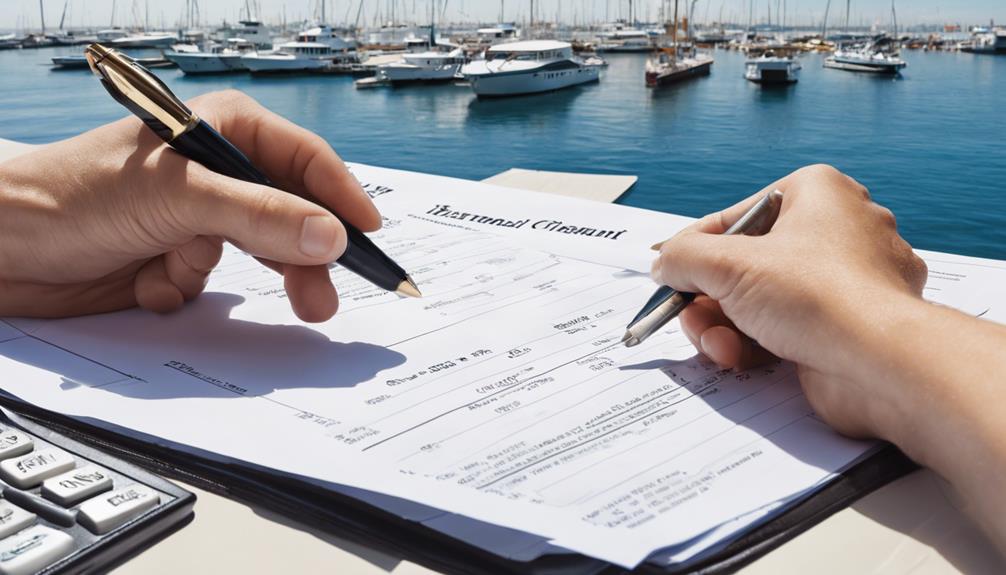If you're considering becoming a vessel dealer in Washington, you need to understand the significance of the $5,000 bond. This bond not only protects consumers but also establishes your credibility in the boating industry. Meeting eligibility requirements is essential, and the costs can vary based on your financial stability. But what happens if you fail to comply with the regulations? The implications could be more severe than you think, so let's explore what you really need to know to navigate this process effectively.
What Is a Vessel Dealer Bond?

A Vessel Dealer Bond is a type of surety bond that you need if you're in the business of buying and selling boats. This bond serves as a safeguard for your customers and the state, ensuring that you comply with relevant laws and regulations. When you obtain this bond, you're essentially promising that you'll conduct your business ethically and responsibly.
These bonds are crucial for maintaining accountability within the boat sales industry, as they help protect consumers from financial harm due to dishonest practices, such as claims against bonds for fraud.
In many states, including Washington, having a Vessel Dealer Bond is a legal requirement for vessel dealers. It protects consumers from financial loss due to potential misdeeds, such as fraud or failure to deliver purchased boats. If you don't uphold your obligations, the bond provides a way for affected parties to seek compensation.
To secure a Vessel Dealer Bond, you usually have to pay a premium based on the total bond amount, which is often set at ,000. Your credit history and business experience may affect your premium rate.
Additionally, this bond can enhance your credibility in the industry, making it easier for you to build trust with customers and partners. In summary, a Vessel Dealer Bond is crucial for anyone serious about operating in the boat sales market.
Importance of the ,000 Bond
Understanding the importance of the $5,000 bond is vital for anyone in the vessel dealership business. This bond serves as a financial safety net, protecting your customers and the public from potential losses caused by your actions or negligence. If you fail to adhere to state regulations or if you engage in fraudulent practices, the bond ensures that affected parties can receive compensation.
Moreover, this bond is part of a broader category of Illinois Surety Bonds that facilitate compliance and protect against financial loss.
Additionally, having this bond in place enhances your credibility and builds trust with your clients. It shows that you're serious about your responsibilities and willing to stand behind your commitments. This trust can help you build a loyal customer base, which is essential for long-term success in the competitive vessel market.
Furthermore, many lenders and suppliers may require you to have this bond before they do business with you. It can open doors to financing options and partnerships that are crucial for your dealership's growth.
In short, the $5,000 bond isn't just a regulatory requirement; it's an essential tool for risk management and business development. By securing this bond, you're investing in the future of your vessel dealership.
Eligibility Requirements for Dealers

Navigating the eligibility requirements for vessel dealers can feel overwhelming, but knowing what's needed simplifies the process.
First, you must have a valid business license in Washington State. This ensures you're legally authorized to operate. Additionally, you need to be at least 18 years old, demonstrating you have the legal capacity to enter into contracts.
Next, you'll want to establish a physical location for your business. This location must meet local zoning regulations, ensuring you're compliant with local laws.
You'll also need to have a sales tax registration with the Washington Department of Revenue. This is crucial for handling sales tax on your transactions.
If you're planning to sell vessels, make sure you're familiar with the state's regulations concerning vessel sales and warranties. You might also be required to provide proof of liability insurance, which protects both you and your customers.
Lastly, ensure you have a good credit history, as this can impact your ability to secure the necessary bond.
Application Process Overview
Once you've met the eligibility requirements to become a vessel dealer, the next step is the application process.
Start by gathering all necessary documentation, including proof of your business identity, financial statements, and any previous licensing information. It's also essential to check the legal requirements for bonding specific to your state, as these can vary.
You'll need to complete the official application form specific to your state.
Once you've filled out the application, submit it to the appropriate state agency, often the Department of Licensing or a similar entity. Make sure to double-check that you've included all required documentation; incomplete applications can lead to delays.
After submission, you might be asked to provide additional information or clarification. Be prepared to respond promptly to any requests to keep your application on track.
Once your application is reviewed and approved, you'll receive confirmation. At this point, you can proceed to secure your $5,000 bond, which is essential for operating as a vessel dealer in Washington.
Costs Associated With the Bond

Securing a vessel dealer bond involves several costs that you should be aware of before proceeding. First, there's the premium you'll pay to the surety company, which typically ranges from 1% to 3% of the bond amount. For a $5,000 bond, this means you could expect to pay between $50 and $150 annually.
Your credit score and financial history can influence this premium, so it's wise to check your credit beforehand.
In addition to the premium, you might encounter administrative fees. Some surety companies charge a processing fee when you submit your application, which can vary widely.
You'll also need to consider potential renewal costs; bonds generally need renewal every year, and prices can change based on your risk profile.
Lastly, if your finances are less than stellar, you might need collateral or a higher bond amount, increasing your overall costs.
Bond Coverage and Limitations
A vessel dealer bond provides essential protection for both dealers and their customers, but it's crucial to understand its coverage and limitations. This bond mainly protects consumers against potential fraudulent activities by the dealer, ensuring they'll receive compensation if the dealer fails to comply with state laws or engages in unethical business practices.
However, it's important to note that this bond doesn't cover every situation. For example, it won't protect against personal disputes between buyers and sellers or issues arising from a dealer's negligence.
The bond is also limited in coverage amount; in Washington, for instance, the bond typically covers up to $5,000. If a claim exceeds this limit, you might need additional coverage or resources to settle the remaining balance.
Additionally, the bond doesn't cover damages related to defective products or warranty claims. You'll need other forms of insurance to protect against those risks.
Understanding these limitations can help you make informed decisions as a dealer and manage customer expectations effectively. Always review the specific terms of your bond to ensure you're clear on what's included and what isn't.
Renewal and Maintenance of the Bond

To keep your vessel dealer bond in good standing, timely renewal and proper maintenance are essential. You'll want to stay on top of your bond's expiration date, as failing to renew on time can lead to lapses in coverage. Typically, these bonds are valid for a year, so mark your calendar well in advance to ensure you're prepared.
When it's time for renewal, review any changes in your business operations that could affect your bond requirements. If you've increased your sales volume or changed your business structure, you might need to adjust your bond amount or terms. Contact your surety provider for guidance on any necessary modifications.
Proper maintenance also involves keeping accurate records of your transactions and ensuring you comply with all state regulations. Regularly check in with your surety company to confirm that your bond is still active and meets all requirements.
Additionally, maintain good financial practices and a solid reputation in the industry, as these factors can influence renewal terms and costs. By staying proactive, you'll ensure your vessel dealer bond remains valid and effective, allowing you to conduct business without disruptions.
Consequences of Non-Compliance
Non-compliance with vessel dealer bond requirements can lead to serious consequences that may jeopardize your business operations. If you fail to obtain or maintain your bond, you risk losing your license to operate. Regulatory authorities take these bonds seriously, and without one, you could face penalties, including fines or even legal action.
This can't only damage your financial standing but also tarnish your reputation in the industry. Additionally, customers may lose trust in your business if they learn that you're not compliant with bonding requirements. This loss of confidence can lead to decreased sales and potential loss of existing clients.
You might also face challenges in securing future financing or partnerships, as lenders and investors often look for compliant businesses to minimize their risk. In the worst-case scenario, if your business faces a claim due to non-compliance, you could be held personally liable for damages.
This means you'd have to cover the costs out of pocket, which can be financially devastating. To protect your business and ensure smooth operations, it's essential to stay up to date with all bonding requirements and maintain compliance at all times.
Tips for Securing Your Bond

Maintaining compliance is vital, but securing your vessel dealer bond can feel daunting. To make the process smoother, start by gathering all necessary documentation.
You'll need proof of your business's financial stability, a valid business license, and any relevant personal information, such as your credit history. Having these documents ready will speed up the application process.
Next, research bond providers thoroughly. Look for companies with good reputations and reviews from other vessel dealers. It's crucial to compare rates and terms, as costs can vary significantly.
Don't hesitate to ask questions to ensure you understand the terms of the bond.
Consider your credit score, too. A higher score can lead to lower premium rates, so if your score needs improvement, take time to boost it before applying.
Additionally, be honest in your application; providing accurate information builds trust with your bond provider.
Resources for Vessel Dealers
Navigating the complexities of the vessel dealer industry can be overwhelming, but various resources are available to help you succeed.
First, connect with industry associations like the National Marine Manufacturers Association (NMMA) or the Marine Retailers Association of the Americas (MRAA). These organizations offer valuable networking opportunities, educational resources, and advocacy to help you understand regulatory changes.
Consider attending trade shows and expos, where you can engage with fellow dealers, manufacturers, and suppliers. These events often provide workshops and seminars that can enhance your skills and knowledge about market trends.
Online forums and social media groups dedicated to vessel dealers can also be beneficial. You can share experiences, seek advice, and learn from others who've faced similar challenges.
Don't underestimate the power of local business development centers, which often provide workshops and mentorship programs tailored to small businesses.
Conclusion
In summary, the WA Vessel Dealer $5,000 Bond is essential for your boat dealership's credibility and compliance. By understanding its importance and fulfilling the eligibility requirements, you can secure the bond that protects both you and your customers. Keep track of renewal dates and stay informed about costs to ensure smooth operations. With the right approach, you can build trust in the industry and focus on growing your business while safeguarding consumer interests.


